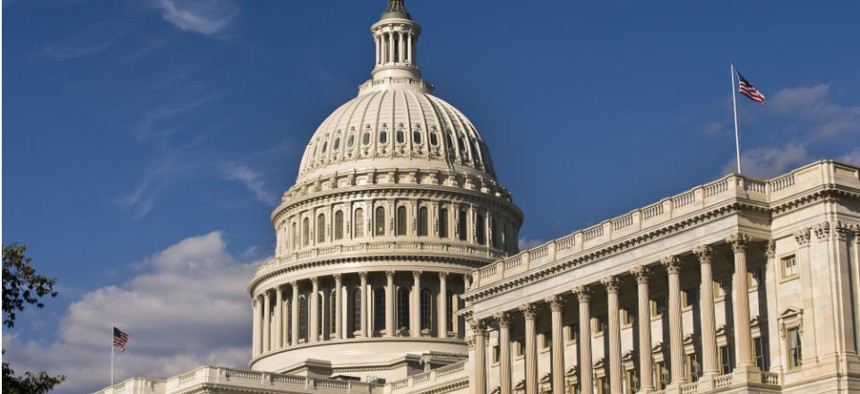
mj007/Shutterstock.com
House Clears Bill Making it Easier to Fire VA Execs
Overhaul legislation would cut off terminated employees’ pay immediately, but allow them seven days for an MSPB appeal.
The House on Wednesday approved 420-5 a compromise bill to ease the firing of senior executives at the Veterans Affairs Department, as part of a larger set of reforms to overhaul the troubled agency.
The legislation would allow the VA secretary to fire any Senior Executive Service employee -- or equivalent Title 38 medical professional -- immediately, with paychecks getting cut off the day of the termination. The affected executive would then have seven days to issue an appeal to the Merit Systems Protection Board, which in turn would have 21 days for an expedited adjudication. MSPB’s ruling would be final. If the board failed to issue a ruling within the 21-day timeframe, the firing would continue.
The bill largely adopts the firing language from a measure approved by the Senate in June, but removes the opportunity for a second appeal to a presidentially appointed, Senate-confirmed, three-member MSPB panel. The language is still less severe than the version that cleared the House in May, which would not have provided for any recourse for a fired VA executive.
The proposal “holds people within the department accountable,” said Rep. Jeff Miller, R-Fla., co-chairman of the conference committee established to resolve differences between Senate and House VA reform measures, at a press conference Monday to announce the agreement. “That’s something that both bodies wanted to do. If I had written this, the secretary would have had the ability to fire the top level individuals without an appeal. Sen. Sanders [I-Vt., the other chairman of the conference committee] wanted the appeal in there. This is the compromise we were able to reach.”
Despite the appeal rights, the bill raises due process concerns previously voiced by federal employee advocates and Democratic lawmakers, as it takes away pay before giving employees the opportunity to challenge the decision.
“I’m sure people will have that concern,” Sanders said. “This is a compromise bill.” He added the expedited process was necessary to cut out red tape: “We do not want the appeals process going on month after month, year after year.”
Sanders said the bill was not his ideal legislation, but it represented a rare bipartisan agreement in Congress.
Carol Bonosaro, president of the Senior Executives Association, said she was pleased Congress reached an agreement to give veterans care more quickly, but said the SES provision “still makes no sense.” She said data showing very few senior executives fired at VA are misleading, as the leaders often accept resignations instead of being fired. She added it’s “very easy” for agencies to fire SES employees, though they must provide a 30-day written notice of upcoming negative actions.
“The notion you need more tools is just ridiculous,” Bonosaro told Government Executive. “By putting this in, what they’ve done is gone way too far. They’re putting career executives on the same footing as political appointees.”
A Sanders aide said the bill includes a provision requiring MSPB to report back to Congress on how it would meet demands for expedited appeals. The aide added that a fired senior executive’s pay would be reinstated -- including the salary lost during the appeals process -- upon a successful MSPB appeal.
The legislation also includes a provision to reform performance metrics for VA employees. Lawmakers -- and even the VA itself in an internal report -- pointed at the tying of bonuses to patient wait times as implicitly encouraging employees to manipulate data. The bill would ensure that scheduling and wait-time data are not factored into whether employees receive performance awards. Ratings would instead focus on the quality of care veterans receive.
Overall, the bill would add about $17 billion in emergency, non-appropriated funds to the VA to boost hiring of doctors, nurses and other medical personnel, as well as support the construction of new medical facilities across the county. About $5 billion of that total will be offset by cuts within the VA, meaning the bill would provide about $12 billion total in new funding.
Miller said any additional funding VA may need in the future would have to go through the normal appropriations process. Sanders added the measure would deal with both immediate and future issues at the agency.
“Longer term, I hope VA will have the doctors, nurses and the culture to make sure that every eligible veteran in the country gets timely and quality health care,” Sanders said.
The bill would allow veterans without immediate access to VA facilities to seek medical treatment at private practices, a provision already passed by both the House and Senate.
Negotiations led by Miller and Sanders were difficult, and appeared stalled out just last week. The pair said they were in constant communication, however, and were able to hammer out their differences over the weekend. Both lawmakers said they did not anticipate a problem whipping up the necessary votes in their respective chambers, and the House passed the measure with minimal resistance despite initial concerns that conservative Republicans would not agree to new funding without corresponding offsets.
Sanders said he expects the Senate to pass the bill Thursday. Even after the bill is signed, however, he will not consider the problem to be fixed.
“This is not the end, this is the beginning,” Sanders said. “God knows there is a lot more work to be done.”
(Image via mj007/Shutterstock.com)







